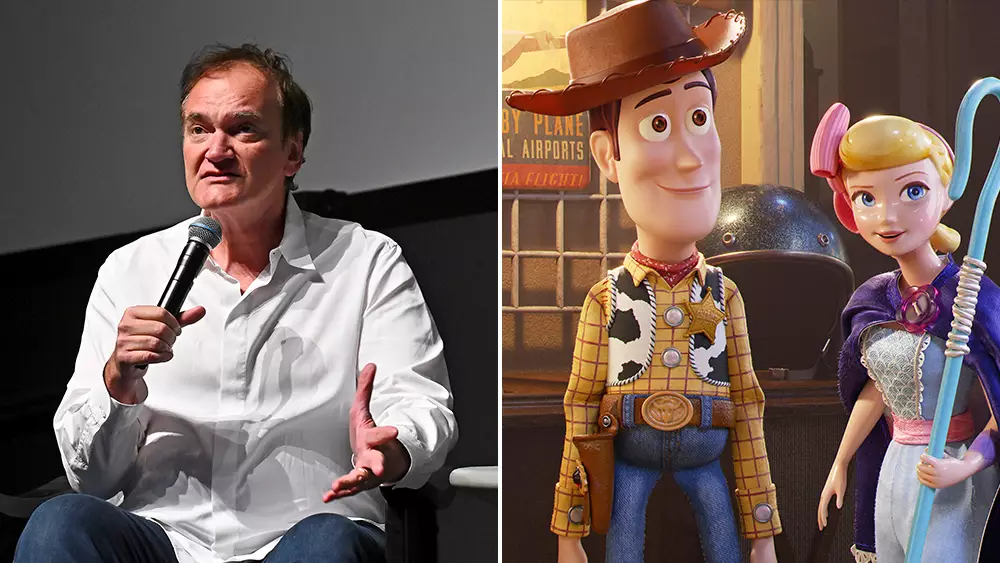Renowned filmmaker Quentin Tarantino made headlines recently during his appearance on the Club Random podcast with Bill Maher, as he openly expressed his disinterest in continuing with the Toy Story saga. Known for his distinct style and narrative craftsmanship, Tarantino’s insights into storytelling resonate within the film community. His refusal to watch the fourth installment of the beloved animated franchise stems from an appreciation for the original trilogy, which he describes as a perfect and fulfilling narrative arc. His critical lens, often applied in analyzing cinematic masterpieces, finds a particular focus on the concept of closure, which he argues is rarely achieved in trilogies.
The Art of Trilogy Completion
Tarantino’s commentary suggests that crafting a compelling trilogy is not merely about creating three films that resonate individually but ensuring that they collectively evolve and culminate in a satisfactory conclusion. In his discussion with Maher, he posits that only a select few trilogies have managed to transcend the boundaries of conventional storytelling. Highlighting the iconic Dollars Trilogy crafted by Sergio Leone, he emphasizes how the films — A Fistful of Dollars, For a Few Dollars More, and The Good, the Bad and the Ugly — collectively represent a towering achievement in cinematic storytelling. Here, each subsequent narrative builds upon its predecessor, pushing boundaries and expanding the universe while simultaneously delivering a resonant emotional payoff.
As Tarantino critiques other trilogies, he points to the Mad Max series as a prime example of a narrative misstep. Despite its ambitions and notable entries, he articulates that the sequels fail to deliver the decisive conclusion that audiences crave. Contrarily, he praises the Toy Story films for managing to achieve that elusive narrative closure with its third installment, which he describes as “magnificent.” This distinction arises from his belief that the emotional depth and thematic resonance are both meticulously handled in the earlier films, culminating in a third act that profoundly impacts viewers. By contrast, the introduction of a fourth film—although potentially well-crafted—risks tarnishing the original masterpiece that concluded the story.
Cinematic Expectations vs. Financial Realities
Tarantino’s hesitation to engage with Toy Story 4 reveals a broader contention within the film industry: the tension between artistic integrity and commercial imperatives. As franchises generate revenue, studios often pursue expansions that may dilute the original vision. Disney’s announcement of Toy Story 5, while lucrative, perplexes filmmakers like Tarantino who prioritize cohesive storytelling. The fear of undermining carefully constructed narratives by extending their life through sequels speaks to the fundamental question many creatives grapple with: Should successful stories remain untouched, or can they sustain a legacy in new forms?
Implicit in Tarantino’s insights is a profound respect for the emotional journeys crafted through film. He encapsulates the essence of what makes storytelling impactful—its ability to resonate deeply with audiences, invoking feelings of nostalgia, joy, and sometimes heartbreak. He argues that a perfectly concluded narrative transforms characters and themes into a collective experience that’s hard to replicate. For fans of the original Toy Story trilogy, the finale offered a closure that completely unified the themes developed throughout the series.
Quentin Tarantino’s views provoke a reflection on the value of cinematic storytelling. While the allure of sequels can be financially tempting, it raises critical questions about artistic choices versus commercial gain. As audiences, we must ponder the significance of narrative closure and whether reopening finished stories can ever enhance their legacy. In the world of entertainment, it’s essential to weigh the merits of exploring new narratives against the sanctity of established triumphs, allowing us to appreciate both the artistry involved and the cultural impact of our beloved stories.


Leave a Reply